
Capital gains taxes are part of the deal whenever you sell real estate for a profit, but Alaska makes things easier since there’s no state-level tax to worry about. You’re already ahead of the game just by being here instead of somewhere like New York or California.
A capital gains tax calculator helps you figure out what you’ll actually owe based on your specific numbers. These tools are pretty handy. You tell them what you paid, what you’re selling for, and how long you’ve owned the place. Then, they spit out an estimate.
Read this guide to learn more about capital gains in Anchorage! We’ve also thrown in a few calculators to help with your calculations!
What Is Capital Gains Tax?

Capital gains tax is what you pay on the profit when you sell an asset that’s gone up in value. Say you bought your Anchorage house for $250,000 five years ago and now you’re selling it for $380,000. That $130,000 profit is your capital gain, and the IRS considers it taxable income.
The government doesn’t tax you on the full sale price; it taxes only the profit you made above what you originally paid.
Your cost basis is the starting point for this calculation. This includes your purchase price, plus certain expenses such as major renovations or improvements you have made over the years.
The rate you’ll pay depends on several factors:
- Your total taxable income for the year
- How long have you owned the property
- Whether you’re filing as single, married, or head of household.
Most people don’t realize how much these things can change what they owe until they actually run the numbers.
The calculation isn’t overly complicated once you understand the basics, but if you get it wrong, it can cost you a significant amount of money. You could also leave deductions on the table that could’ve reduced your bill significantly.
Federal vs. State Capital Gains Tax
Federal capital gains taxes affect everyone, but the rates depend on how long you owned the property.
Long-term gains (property held over a year) get taxed at 0%, 15%, or 20% based on your income, while short-term gains get taxed like regular income at rates up to 37%. Most middle-income people fall into the 15% bracket for long-term gains.
Alaska doesn’t charge any state capital gains tax or state income tax, which is a significant advantage for sellers in the state. Compare that to California, where the state takes up to 13.3% on top of federal taxes, and you’ll see why Alaska is so attractive for real estate transactions.
Short-Term vs. Long-Term Capital Gains
The difference between short-term and long-term capital gains is essentially a matter of timing. If you own your property for a year or less, you’re stuck with short-term rates (10% to 37%), but if you hold it for more than a year, you drop to long-term rates (0%, 15%, or 20%).
The IRS counts from the day after you bought to the day you sell, so if you purchased on March 15, 2025, you’d need to hold until March 16, 2026, for long-term treatment.
Let’s say you’re a single filer making $120,000 and you sell a rental for a $60,000 profit. That means if you sell at 11 months, you’ll pay 24% ordinary income tax ($14,400). Meanwhile, if you wait until month 13, you only pay 15% long-term capital gains tax ($9,000).
That’s $5,400 saved just by being patient. Unfortunately, most sellers don’t realize they’re leaving this money on the table until it’s too late.
Capital Gains Tax Calculator for Anchorage, AK
Online calculators make figuring out your capital gains tax way less painful than doing it by hand. You’ll find several good options that walk you through the process step by step, and they’re all free to use.
Here are some top calculators that can help you estimate what you’ll owe on your Anchorage property sale.
1. SmartAsset Capital Gains Tax Calculator
SmartAsset’s calculator is likely the most user-friendly option available, covering both federal and state taxes in one convenient location.
You enter your initial purchase price, sale value, how long you owned the property, your ZIP code, annual income, and filing status. The tool then breaks down your tax liability by federal, state, and local amounts. However, you’ll only see federal numbers for Alaska since there’s no state capital gains tax here.
What’s really helpful is the side-by-side comparison showing what you’d pay with short-term versus long-term gains. You can see exactly how much money you’d save by holding the property longer.
The calculator also shows your marginal tax rate versus your effective tax rate. This will help you understand how the progressive tax system actually works in practice.
2. Asset Preservation, Inc. Capital Gain Tax Calculator
This calculator is specifically designed for real estate investors and individuals conducting 1031 exchanges, providing more detailed information than most basic calculators.
You’ll work through five separate calculation sections: net adjusted basis, capital gain, capital gain tax due, after-tax equity, and reinvestment analysis. It’s a bit more involved, but it provides a comprehensive view of your financial situation.
The tool allows you to factor in depreciation recapture, which is particularly helpful if you’ve owned a rental property and claimed depreciation deductions over the years.
You can select different federal capital gains rates (15% or 20%) and the Medicare surtax (0% or 3.8%) based on your income level. It also allows you to enter your specific state tax rate, although Alaska residents can leave that at zero.
3. Valur Alaska Capital Gains Tax Calculator
Valur offers a calculator that’s tailored specifically for Alaska residents, which is super convenient. The tool focuses on the unique advantages Alaska offers with its lack of state income and capital gains taxes.
You’ll get a breakdown of federal taxes only, which simplifies the whole process since you’re not juggling multiple tax jurisdictions.
The calculator also provides information about tax-planning strategies, such as Charitable Remainder Trusts and renewable energy investments, that can help reduce your tax burden.
It’s more educational than some other calculators. It’ll walk you through different scenarios and show you ways to legally defer or reduce capital gains taxes, potentially.
4. Public Capital Gains Tax Calculator
The public’s calculator keeps things simple, which is great if you just want a quick estimate without a ton of extra features.
You enter your purchase value, sale value, length of ownership, state, tax year, filing status, and taxable income. The tool immediately calculates your total capital gains tax and shows your applicable federal rate, pre-tax gain, and after-tax gain.
The interface is clean and easy to understand, making it perfect for first-time sellers who are unfamiliar with tax terminology. You can quickly see how different variables affect your tax bill by adjusting the numbers and watching the results change in real time.

How to Calculate Capital Gains Tax in Anchorage, AK
To calculate your capital gains tax manually, you’ll need some basic information about your property purchase and sale, plus your income details for the year. Here’s how to work through the calculation from start to finish.
Step 1: Determine Your Cost Basis
Your cost basis is what you originally paid for the property, but it’s not just the purchase price. You can also include closing costs from the time you purchased the property, such as title insurance, recording fees, and transfer taxes. You should also include any significant improvements you’ve made over the years, such as a new roof, a kitchen renovation, or the addition of a deck.
What you can’t include are repairs and maintenance costs. The IRS draws a line between improvements that add value versus regular upkeep, so they don’t count even if they were expensive.
Please keep all your receipts and records for improvements because they directly reduce your taxable gain. If you bought your house for $300,000 and spent $50,000 on a central kitchen remodel and new roof, your cost basis is now $350,000. That’s $50,000 less profit you’ll pay taxes on when you sell.
Step 2: Calculate Your Capital Gain
Once you know your cost basis, calculating your gain is straightforward. Start by subtracting your cost basis from the sale price to determine your gross capital gain. Next, deduct selling expenses such as real estate expert commissions, advertising, legal fees, and any repairs made specifically to prepare the home for sale. Working with a reliable cash home buyer in Anchorage and surrounding Alaska cities can also help streamline this process and potentially reduce some of these costs.
If you sold your house for $450,000 with a cost basis of $350,000, paid $27,000 in real estate commissions, and another $3,000 in closing costs, your calculation looks like this:
$450,000 – $350,000 – $27,000 – $3,000 = $70,000 taxable capital gain.
That’s the number the IRS cares about. It’s what you’ll use to figure out your tax bill. The more expenses you can legitimately deduct, the lower your taxable gain becomes.
Step 3: Apply the Appropriate Tax Rate
Now, you need to determine which tax rate applies to your situation based on how long you have owned the property and your total taxable income for the year. If you owned it for more than a year, you’ll use the long-term capital gains rates.
In 2025, single filers with income under $48,350 pay 0%, while income between $48,350 and $533,400 is taxed at the 15% rate. For amounts above $533,400, you’re in the 20% bracket, plus the 3.8% Net Investment Income Tax if your income exceeds $200,000.
Take your capital gain and multiply it by your rate to get your federal tax bill. Using our $70,000 gain example, if you’re a single filer making $100,000 a year, you’d fall into the 15% bracket. This means $10,500 in federal capital gains tax ($70,000 x 0.15), and since Alaska has no state tax, that’s your total bill.
Exemptions and Deductions That Can Reduce Your Gains Tax
There are fantastic ways to cut down what you owe in capital gains taxes. The IRS gives you several breaks that can reduce your tax bill, and not enough people take full advantage of them. Here are the big ones that could save you thousands.
Primary Residence Exclusion
This is one of the biggest tax breaks available for real estate. If your Anchorage home has been your primary residence for at least two of the last five years before selling, you may be able to exclude up to $250,000 of capital gains if you’re single. Learn more about how our process works to take advantage of this benefit.
Meanwhile, if you’re married and filing jointly, $500,000. That’s profit you keep without paying a penny in federal taxes.
Let’s say you bought your house for $200,000 and sold it for $650,000 after living there for three years. That’s a $450,000 gain, but if you’re married, you pay zero taxes because your entire gain is under the $500,000 exclusion.
You don’t even need to buy another home to qualify. Just sell, and the exclusion is yours as long as you meet the residency requirement.
Home Improvement Deductions
As we’ve mentioned, home improvements directly lower your taxable gain. The key is “improvements,” not “repairs.”. The IRS wants to see upgrades that add value to your home. For example, a new roof, a renovated kitchen, a finished basement, or a new HVAC system all count and can add thousands to your cost basis.
Keep every receipt and invoice from these projects, as the IRS may request proof of them. If you spent $80,000 over the years on improvements, that’s $80,000 less gain you’ll pay taxes on, which at a 15% rate saves you $12,000.
Just don’t include things like painting or fixing a broken window. Those don’t count, even though they cost money.
Selling Costs and Capital Gains
The costs you incur when selling can help lower your taxable capital gain. Real estate agent commissions are usually the largest expense; 6% on a $400,000 home would be $24,000 alone. You can also deduct title insurance, escrow fees, attorney fees, transfer taxes, and recording fees. Partnering with a trusted company that buys homes in Bethel and other cities in Alaska can simplify the process and help you maximize these deductions.
Even money you spent getting the house ready to sell counts in some cases. If you hired someone to do repairs specifically to make the home more marketable (like fixing that wonky garage door), those costs reduce your gain.
If you add it all up, you might be looking at $30,000 to $40,000 in selling costs, which directly lowers what you owe in taxes.
Exceptional Circumstances Affecting Capital Gains in Anchorage
Not every property sale is direct, and some situations come with their own tax rules that can actually work in your favor. Let’s look into what may apply to your case.
Inherited Property
Inheriting property comes with a significant tax advantage known as the “step-up in basis.” It’s one of the best breaks in the tax code.
When you inherit a house, your cost basis isn’t what the original owner paid. It’s the fair market value on the date of their death. So if your parents bought their Anchorage home in 1985 for $80,000 and it’s worth $450,000 when you inherit it, your basis is $450,000.
This means if you turn around and sell for $450,000, you owe zero capital gains tax. Even if you wait a few years and sell for $480,000, you will only pay taxes on the $30,000 increase, not on the full appreciation that occurred during your parents’ ownership.
Divorce Settlements
Transferring property between spouses during a divorce doesn’t trigger any immediate capital gains tax. This is quite good news during an already stressful time.
The IRS treats it as a tax-free transfer, and whoever gets the house takes on the same cost basis that the couple had together.
However, if you’re keeping the house and plan to sell it soon, you need to consider whether you’ll still qualify for the primary residence exclusion.
You can still claim the full $500,000 exclusion if you file jointly in the year of sale; however, if you’re already divorced, you’re limited to the $250,000 single-filer exclusion. The timing of your sale can significantly impact your tax bill.
Investment Properties
Investment properties and rental homes don’t qualify for the primary residence exclusion, so you’re on the hook for capital gains taxes on the full profit.
The rates are the same: 0%, 15%, or 20% for long-term gains, but you can’t exclude any of it like you could with your primary home. You also have to deal with depreciation recapture, which we’ll discuss in more detail later.
One effective strategy is a 1031 exchange, where you roll your profits into another investment property, thereby deferring the capital gains tax entirely. You need to follow strict rules and timelines, but it allows you to keep growing your real estate portfolio without losing a significant portion to taxes every time you sell.
What to Avoid When Calculating Capital Gains
People often make mistakes in their capital gains calculations, which can result in financial losses. Here’s what to watch out for:
- Not keeping good records of improvements and expenses. When it’s time to sell, you can’t prove what your actual cost basis should be. If you don’t have receipts, the IRS won’t let you add those improvements to your basis, which means you’ll pay taxes on gains that aren’t really gains.
- Misunderstanding the two-out-of-five-years rule. Some people think they need to have lived in the house for two consecutive years right before selling, but that’s not true. The two years just need to fall somewhere within the five years before the sale date, and they don’t even need to be continuous.
- Forgetting to include selling costs. Real estate commissions, legal fees, and closing costs all reduce your taxable gain, but people fail to deduct them because they’re focused on the sale price.
- Confusing repairs with improvements. Regular maintenance, such as painting or fixing a leaky faucet, doesn’t affect your cost basis. However, people try to include these anyway and get surprised when the IRS rejects them.
- Selling just before the one-year mark. Being impatient and selling at 11 months instead of waiting for long-term capital gains treatment can double or triple your tax rate. That extra month of patience could save you thousands.

Depreciation Recapture and Its Impact on Gains
When you own a rental property, you can deduct depreciation as a tax break every year. However, when you sell, the IRS wants some of that money back, and it taxes it at a flat 25% rate.
That means if you bought a rental for $300,000 and claimed $50,000 in depreciation over the years. When you sell for $400,000, the $50,000 depreciation is taxed at 25% ($12,500), and then you pay your regular capital gains rate on the remaining profit.
You can avoid this by doing a 1031 exchange and rolling everything into another investment property.
Time Your Sale to Minimize Capital Gains Tax
Timing can significantly impact your tax bill, and most people don’t consider it until it’s too late. The most obvious one is waiting past the one-year mark to secure long-term rates instead of short-term, which can cut your tax rate in half.
However, your total income for the year is also essential. Selling during a low-income year could drop you into a lower capital gains bracket.
End-of-year timing is another thing to consider. Sell in December and you’ll be paying taxes in a few months, but push it to January and you’ll have an extra year before the bill is due.
If you’re selling more than one property, consider spreading the sales across different tax years to prevent being pushed into a higher tax bracket all at once. Anchorage Home Buyers can help you plan your sales strategically to minimize your tax liability.
Work with Cash Buyers in Anchorage!
Cash buyers offer a completely different selling experience that can actually simplify your capital gains situation. The transaction closes much faster (in weeks instead of months), which gives you more control over exactly when the sale occurs for tax purposes.
Plus, you avoid real estate commissions, and often the buyer covers closing costs. This means fewer expenses eating into your proceeds.
Cash buyers don’t care about the condition of your property either, so you’re not spending money on repairs or upgrades just to sell. If you’ve got an inherited property or a rental that needs work, selling for cash lets you avoid pouring more money into a place you’re leaving anyway.
They’re worth contacting, especially if you’re dealing with a complex tax situation or simply want to move forward quickly.
FAQs:
Does Alaska have a capital gains tax on real estate?
No, Alaska doesn’t have any state capital gains tax or state income tax. You only pay federal capital gains taxes when you sell property in Anchorage, which makes Alaska one of the best states for keeping more of your profits.
How much is the capital gains tax on selling a house in Alaska?
You’ll pay federal capital gains tax rates of 0%, 15%, or 20% depending on your income and how long you owned the property. If it’s your primary residence and you lived there for two of the last five years, you can exclude up to $250,000 (single) or $500,000 (married) of gains from taxation.
What is the capital gains exemption for primary residence in Alaska?
The primary residence exemption lets you exclude up to $250,000 of capital gains if you’re single, or $500,000 if you’re married filing jointly. You must have owned and lived in the home as your primary residence for at least two of the five years preceding the sale.
At what age do you not pay capital gains?
There’s no age exemption for capital gains taxes. You pay the same rates regardless of your age. The old over-55 exemption was removed in 1997 and replaced with the primary residence exclusion that applies to all ages.
How do I avoid capital gains tax in Alaska?
Use the primary residence exclusion if you have lived in the home for two of the last five years and have held the property for over a year to qualify for long-term rates. You should also add all improvements to your cost basis, deduct selling expenses, or consider a 1031 exchange for investment properties to defer taxes completely.
How to calculate capital gains on the sale of property?
Take your sale price, subtract your cost basis (which is the purchase price plus any improvements), and then subtract selling costs, such as commissions and fees. The result is your taxable capital gain. Then multiply it by your applicable tax rate based on your income and how long you owned the property.
Key Takeaways: Anchorage, AK Capital Gains Tax Calculator
Capital gains taxes in Anchorage are more manageable than in most states, as Alaska doesn’t impose any state-level taxes on top of federal rates. The primary factors determining your tax rate are the length of time you’ve owned the property and your income level, which decide whether or not you pay 0%, 15%, or 20% on long-term gains. If you’re having difficulty calculating manually, you can always use the calculators we listed in this guide.
Meanwhile, if you’re looking to sell your Anchorage property quickly without repairs, showings, or waiting for financing, call Anchorage Home Buyers at (907) 331-4472. We buy houses for cash in any condition, so you can close on your timeline and skip the traditional sale hassles!
Helpful Anchorage Blog Articles
- What Taxes Do I Have To Pay When I Sell My House In Anchorage, AK
- Anchorage, AK Capital Gains Tax Calculator 2025
- Anchorage, AK closing costs calculator
- Anchorage, Alaska Cost of Living: Is It Affordable?
- Anchorage, Alaska Property Tax Rate
- Paperwork for Selling a House in Anchorage, AK
- Can an Executor of the Will Sell a property in Anchorage, AK?
- How to Sell an Apartment in Anchorage, AK
- Should I Replace My Roof Before I Sell My House in Anchorage, AK?
- Do I Need to Paint My House in Anchorage, AK, to Sell It?
- Do I Need a Lawyer to Sell My House in Anchorage, AK
- How Can Heir Property Be Sold in Anchorage, AK?

